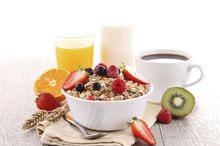What does fact checked mean?
At Healthfully, we strive to deliver objective content that is accurate and up-to-date. Our team periodically reviews articles in order to ensure content quality. The sources cited below consist of evidence from peer-reviewed journals, prominent medical organizations, academic associations, and government data.
- Mayo Clinic: Your Diabetes Eating Plan: Exchange List
- Mayo Clinic: Low-Carb Diet: Could It Help You Lose Weight?
The information contained on this site is for informational purposes only, and should not be used as a substitute for the advice of a professional health care provider. Please check with the appropriate physician regarding health questions and concerns. Although we strive to deliver accurate and up-to-date information, no guarantee to that effect is made.
Breakfast Ideas With 15 Grams of Carbohydrates
A low carbohydrate diet is a weight-loss diet 2. It limits foods high in carbohydrates, such as breads, cereals, rice and fruits, and encourages the intake of foods high in protein and fat. Total daily carbohydrate intake is usually limited to 50 to 150 g a day, according to Mayo Clinic. When planning a 15 g carbohydrate breakfast meal, focus on your protein and fat choices.
Focus on Eggs
Eggs make a great protein to focus on for a low carbohydrate breakfast meal. The classic breakfast of bacon and eggs is a low carbohydrate meal. Two scrambled eggs with three slices of bacon and one slice of whole wheat toast with 1 tsp. of margarine provides approximately 410 calories and 15 g of carbohydrate. Try a three-egg omelet with one cup of non-starchy vegetables, such as onions or mushrooms, and 1 oz. of cheese served with one fresh plum, providing approximately 365 calories and 13 g of carbohydrate. Two boiled eggs with half of an English muffin and 2 tsp. of margarine is a low carbohydrate breakfast with 300 calories and 15 g of carbohydrate. Two scrambled eggs stuffed into one 6-inch corn tortilla topped with 1 oz. of cheese and 1 tbsp. of salsa is another low carbohydrate breakfast providing 300 calories and 15 g of carbohydrate.
- Eggs make a great protein to focus on for a low carbohydrate breakfast meal.
- of cheese served with one fresh plum, providing approximately 365 calories and 13 g of carbohydrate.
Cottage Cheese
40G Carbohydrate Diet
Learn More
Cottage cheese is another protein to consider for a low carbohydrate breakfast. A half-cup serving of 2 percent fat cottage cheese contains 90 calories and 4 g of carbohydrate, according to the USDA Nutrient Database. People following a low carbohydrate diet can pair a half-cup serving of cottage cheese with one cup of cantaloupe for 150 calories and 15 g of carbohydrate. You can pair cottage cheese with vegetables. One cup of 2 percent fat cottage cheese with 10 baby carrots contains 230 calories and 15 g of carbohydrate
- Cottage cheese is another protein to consider for a low carbohydrate breakfast.
- One cup of 2 percent fat cottage cheese with 10 baby carrots contains 230 calories and 15 g of carbohydrate
Focus on Meats
Breakfast is traditionally a high carbohydrate meal with choices such as cereal, milk and fruit. If you want to eat a 15 g carbohydrate breakfast, consider eating non-traditional foods at breakfast, such as poultry or beef. A 4 to 5-oz. portion of grilled chicken breast served with two cups of cooked spinach provides approximately 280 to 325 calories and 15 g of carbohydrate. You can substitute fish or beef for the chicken. Try mixing one can of tuna with 2 tbsp. of mayonnaise and serving it on one slice of whole wheat toast for approximately 300 calories and 15 g of carbohydrate.
- Breakfast is traditionally a high carbohydrate meal with choices such as cereal, milk and fruit.
- of mayonnaise and serving it on one slice of whole wheat toast for approximately 300 calories and 15 g of carbohydrate.
Related Articles
References
- Mayo Clinic: Your Diabetes Eating Plan: Exchange List
- Mayo Clinic: Low-Carb Diet: Could It Help You Lose Weight?
- Brazeau AS, Mircescu H, Desjardins K, et al. Carbohydrate counting accuracy and blood glucose variability in adults with type 1 diabetes. Diabetes Res Clin Pract. 2013;99(1):19-23. doi:10.1016/j.diabres.2012.10.024
- Van Wyk HJ, Davis RE, Davies JS. A critical review of low-carbohydrate diets in people with Type 2 diabetes. Diabet Med. 2016;33(2):148-57. doi:10.1111/dme.12964
- Rabinovitz HR, Boaz M, Ganz T, et al. Big breakfast rich in protein and fat improves glycemic control in type 2 diabetics. Obesity (Silver Spring). 2014;22(5):E46-54. doi:10.1002/oby.20654
- Balić A, Vlašić D, Žužul K, Marinović B, Bukvić Mokos Z. Omega-3 Versus Omega-6 Polyunsaturated Fatty Acids in the Prevention and Treatment of Inflammatory Skin Diseases. Int J Mol Sci. 2020;21(3):741. doi:10.3390/ijms21030741
Writer Bio
Jill Corleone is a registered dietitian and health coach who has been writing and lecturing on diet and health for more than 15 years. Her work has been featured on the Huffington Post, Diabetes Self-Management and in the book "Noninvasive Mechanical Ventilation," edited by John R. Bach, M.D. Corleone holds a Bachelor of Science in nutrition.









